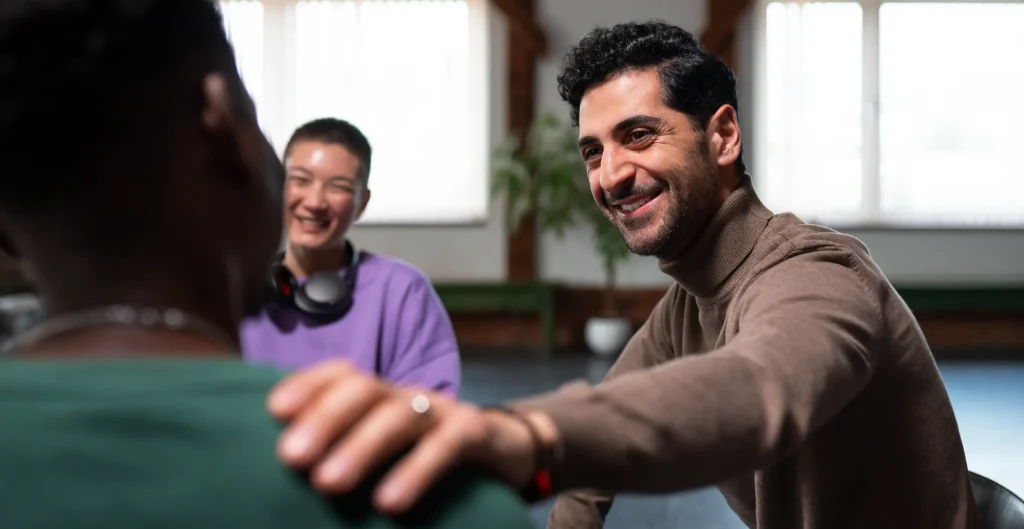It’s natural that loved ones in the family want to help their family member addicted to alcohol or drugs. Often they think they can control the substance user’s behavior and addiction to minimize the risks. In doing so they often enable the substance user because they don’t know how to help and it’s so hard to set limits and say “no”.
Frequently this results in unhealthy family dynamics that actually support the addictive behavior. Read on to learn more about what enabling looks like and steps you can take to not enable.
Enabling and Addiction
So what is enabling? It’s an act in which your well-intended behavior contributes to the person’s addiction. Or to put it another way, enabling is helping someone who can do things for themselves and doesn’t have to because the family member is taking care of it for them.
Family members tend to blame themselves for their loved one’s addiction. So they fall into enabling behaviors. But it’s actually doing something for another person because there is a benefit to what is received in return. In other words, it’s not actually about the substance user. It’s about the family member’s needs.
Often a family member or friend doesn’t realize they are enabling and don’t know the best way to help. They think they are helping the substance user meet their basic needs. Usually this means they are providing a way the substance user can continue using alcohol or drugs. As a result, we can say addiction is a family disease. And when a family member tries to control someone with a substance use problem, it often becomes a power struggle and the enabler often loses that battle.
Family members can love the substance user, but not the addiction or behaviors that go with it. It’s okay to say no and it’s okay to not react when the substance user protests. But some family roles are actually threatened by the addict getting better. Sometimes family members are reluctant to give up their maladaptive roles and the unhealthy coping mechanisms accompanying it.
An enabler can best change their behaviors by distancing from the substance user and seeking therapy to work this change through. This would focus on uncovering why they feel they need to enable and look at what they are receiving from helping the substance user.
How To Know If You Are Enabling a Loved One
It can be very painful to watch a person’s life unravel in front of you. But it’s important to not enable their behavior or you are creating a barrier to the substance user’s recovery. Enabling behaviors can take many forms. If you are doing any of the following, then you are enabling:
| Explaining away the person’s behaviors and actions that maintain their substance use | Giving them money to buy alcohol or drugs, or even buying these for them |
| Letting them live in your home rent-free, without making meaningful contributions | Putting your own life on hold or neglecting your own self-care to focus on them |
| Giving or loaning them money | Bailing them out of jail or paying fines or legal fees |
| Covering up for them with work or school to avoid embarrassment | Blaming yourself in some way for their behavior |
| Paying their bills or legal fees, especially while unemployed or spending money on unnecessary things | Continuing to give them just “one more chance” |
| Cleaning up after them | Threatening actions against them but never following through |
| Denying to others there’s a problem | Lying for them |
How To Prevent Enabling During Recovery of a Loved One
Knowing the fine line between enabling and helping can be challenging. Here are some guidelines:
- Set clear boundaries: Let the person with substance abuse know what behaviors you will no longer tolerate.
- Stop covering for them: Allow the person to experience the natural consequence of their actions. If they get in trouble with the law, let them deal with it.
- Encourage professional help: Don’t fix their problems for them. Instead refer them to an addictions treatment center, therapist or support group that provides the necessary help.
- Practice self-care: Look after your needs as supporting someone with substance abuse issues can be very draining. Begin therapy, join a support group or do the things that are healthy and enjoyable for you.
How To Support Without Enabling
As mentioned in the previous section, providing support without enabling the person takes practice. Wanting to protect the person from the negative consequences of their addictive behavior is a natural feeling from loved ones and friends who care. More often than not, this can worsen the behavior of the person as they may manipulate the goodwill of loved ones and family.
People in recovery need this support but you need to ensure it is offered within healthy boundaries that you can provide and no more. Your focus with them should be on healthy future goals such as following through on their recovery plans, continuing education to support finding a job and managing daily life and finances appropriately.
Is a Loved One Struggling with Addiction?
Located in Anaheim, California, Restorations Health Care can help you or a loved one overcome their addiction or mental health issues. Our mission is all about saving lives. We offer detox and inpatient treatment programs that help people get back on their feet. Our dedicated team of trained addiction professionals and counselors provides individualized addiction treatment programs for recovery. Reach out to our Admissions team now.

Clinical Director
Lacey graduated from Brand University with a MA in Psychology, Marriage & Family Therapy. Lacey is a skilled clinician, supervisor, and administrator with extensive therapy experience. She is responsible for providing clinical leadership and policy direction for our program and maintains accepted standards of medical practice throughout the facility.







